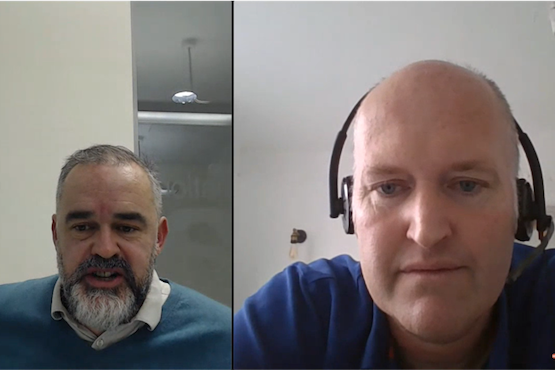Your decision on pay
Summit 2021: On day three, MiP chief executive Jon Restell gave his update on pay and conditions across the UK, and UNISON’s Alan Fox briefed members on the changes to NHS pension schemes following the McCloud judgement.

MiP members face a key decision on whether to back industrial action for the first time in the ongoing dispute over NHS pay, MiP chief executive Jon Restell told members at the third session of MiP’s online Summit on 10 November.
In his presentation on pay, Restell it was “a first for this union” that members in England had voted to oppose the Pay Review Body’s 3% pay rise and said they were willing to take industrial action. UNISON members, including those in MiP, will now take part in a second ballot specifically on the issue of industrial action, he explained.
“UNISON has made it pretty clear that unless there’s a 45% turnout of members [in the second ballot] to meet various legal requirements around industrial action, there will be no further campaign by the union,” explained Restell. “So it will have to be a very, very high turnout and obviously it will have to be a majority in favour of taking industrial action.
“The decision is yours now,” he added “and we strongly encourage you to get involved in that ballot process.”
Serious retention issues across the UK
The situation was different in other parts of the UK, Restell explained. In Scotland, direct negotiations between the Scottish Government and unions resulted in rises of up to a 4% for some staff, but MiP “weren’t very happy with the differential treatment” of members in bands 8 and 9, who saw their award initially restricted to 2%.
The Welsh Government accepted the PRB’s 3% award and paid a similar award to executive managers outside Agenda for Change. Talks were continuing on enhancements to the basic 3% package, Restell explained and members in Wales would be balloted on the deal, with results expected in December. The Northern Ireland Executive was still considering the PRB report with no decision taken as yet, he added.
Across the UK, Restell warned that the NHS faced “serious staff retention issues”, potentially affecting all occupational groups, coming on top of a “historically high” level of vacancies. With inflation expected to top 4% in the coming months, and a recovering private sector jobs market, “the NHS will be competing for people who are going to be in demand in other sectors,” he said.
A “sophisticated and nuanced” view on pay
MiP will be asking members over the next few months how they want the union to campaign on pay in the future. “Our members have a fairly sophisticated and nuanced view on how pay should be determined,” Restell said, explaining that surveys of members showed most were concerned about the pay of their staff just as much as their own pay.
“MiP has always supported the low pay agenda,” he added. “Our members strongly support the Living Wage Foundation rate for our lowest-paid colleagues and there is significant support for a cash underpin to the annual pay award.”
He said the results of MiP’s latest survey, to be published soon, showed that issues such as working hours, the intensity of work, mental wellbeing and flexible working were just as important to members as pay.
Concerted lobbying
But it was important for MiP to keep up the pressure on the government over pay, particularly with the long-term decline in NHS and other public sector earnings during the long period of austerity since 2010, Restell explained.
“This year we’ve got stuck into an active social media campaign with other unions which was fairly high-profile and successful,” he said. The ‘With NHS Staff’ campaign had also seen “concerted lobbying of MPs to try to get some influence amongst Conservative backbenchers and put pressure on the government”, he added. “Although it’s really hard to know that played out in practice, the fact is we saw the government shift from 1% to 3% over the period of our lobbying work.”
For board level members at, whose pay now falls under the remit of the Senior Salaries Review Body (SSRB), Restell explained that MiP had organised events where review body members could meet senior MiP members, chief executives and executive directors. “They were were well received by both the review body and members at that level, who feel that their voices have often not been heard in discussions around NHS pay in the past,” he said.
Real tension
Outlining the key negotiations on terms and conditions over the next year, Restell said that “the extent to which flexible working can be expanded and used in the health service, is going to become a very big issue.”
He explained that MiP’s campaign for overtime payments for managers during the pandemic had been successful in some parts of the country “but it’s still an issue that’s ongoing”.
He warned that some staff were deterred from accepting promotion because their entitlements to unsocial hours and overtime “drop away” as they move up the pay bands, leading to “some real tension with recruitment and promotion” into management jobs.
Speaking on the day health secretary Sajid Javid announced that Covid vaccinations would be made compulsory for ‘frontline’ NHS staff, Restell warned the move could damage staff engagement and retention.
Unions wanted clarification on who would be covered by the policy, as the government’s definition of ‘frontline’ staff could include “a whole range of jobs that aren’t traditionally seen as patient facing roles”, he explained. Unions also wanted clarity on how staff who refused the vaccine would be managed and “what the scope for redeployment might be”.
“I think most of our members are not just supportive of vaccination, but probably supportive of mandatory vaccination as well,” he added. “But a sizeable chunk aren’t – and all our members have expressed some level of concern about the impact of mandatory vaccination on staff engagement and retention.”
How the McCloud judgement affects your pension
After the pay presentation, UNISON pensions officer Alan Fox briefed members on changes to the NHS pension schemes following the judgement in the McCloud case, which ruled that transitional arrangements in the 2015 pension scheme amounted to illegal age discrimination against younger staff.
In the presentation, Fox explained in detail how the changes would affect members’ pension arrangements and the decisions they would need to take as they approached retirement. You can watch the presentation in full here (starting from around 30 minutes in). You can also download the slides from the presentation here.
Related News
-

MiP responds to the abolition of NHS England
Government risk repeating same mistakes as Lansley by abolishing NHS England and cutting more staff from ICBs, says MiP.
-

NHS England and central staff could be cut by 50%, NHSE has announced
Government planned cuts at NHS England go much further than previously announced, with up to 50% of staff at risk.
-

New MiP survey shows growing support for principle of regulating managers, but warns it won’t improve patient safety
MiP’s member survey on regulating NHS managers shows managers are still not convinced regulation will improve patient safety or raise standards, despite growing support for it in principle.